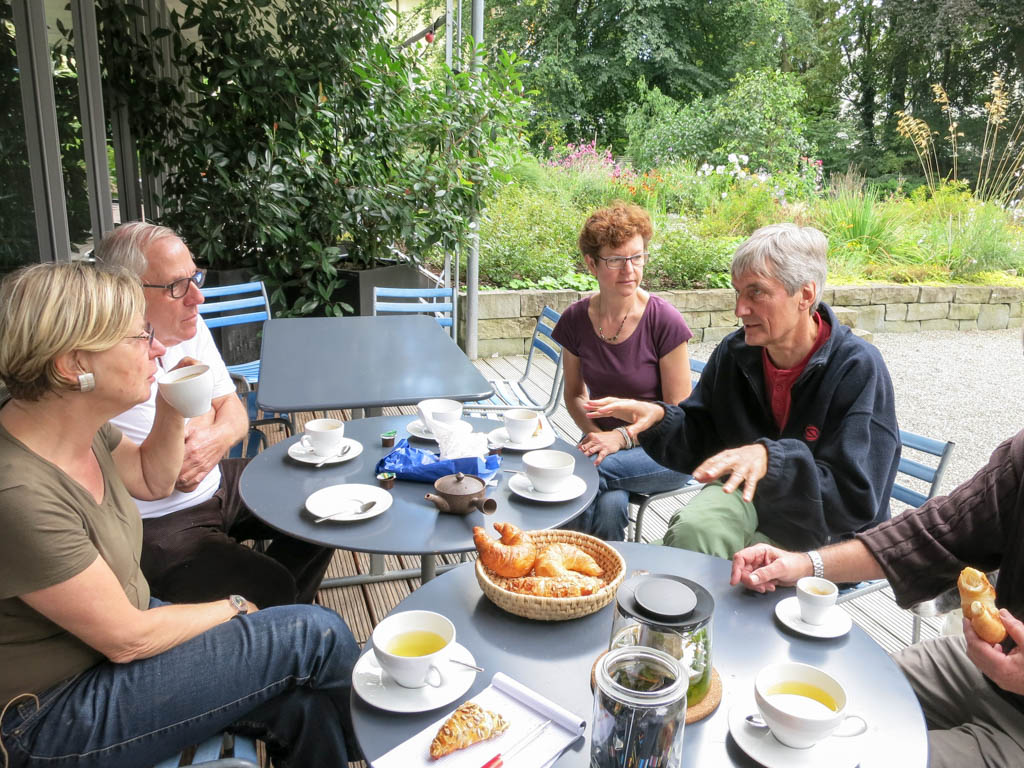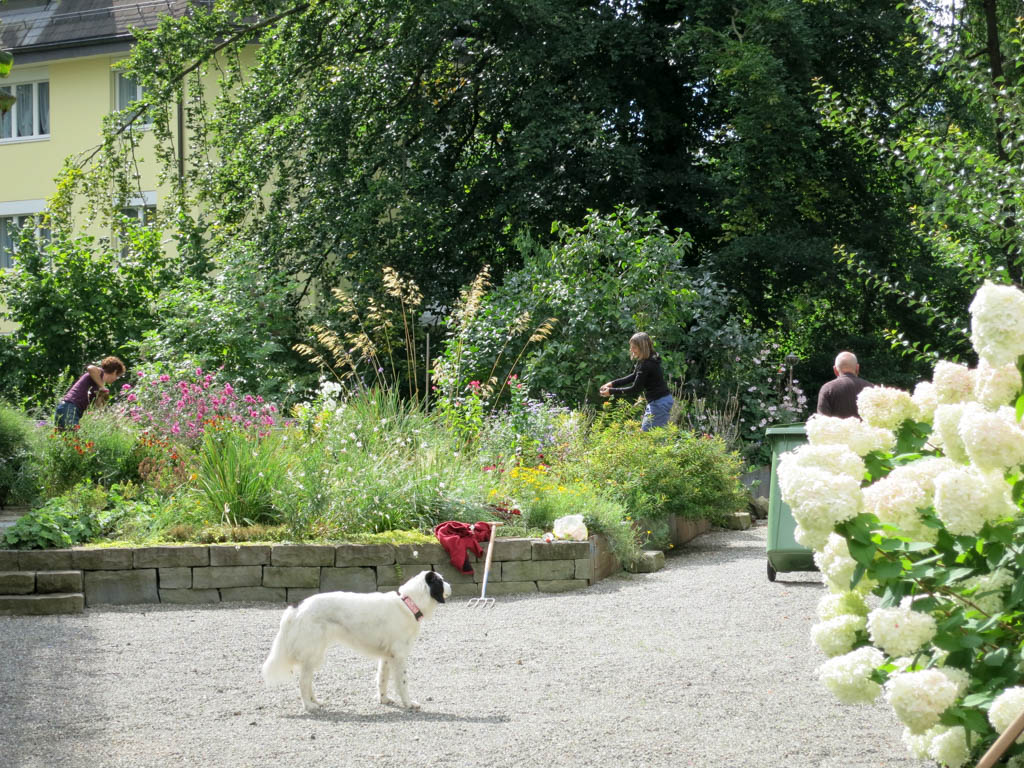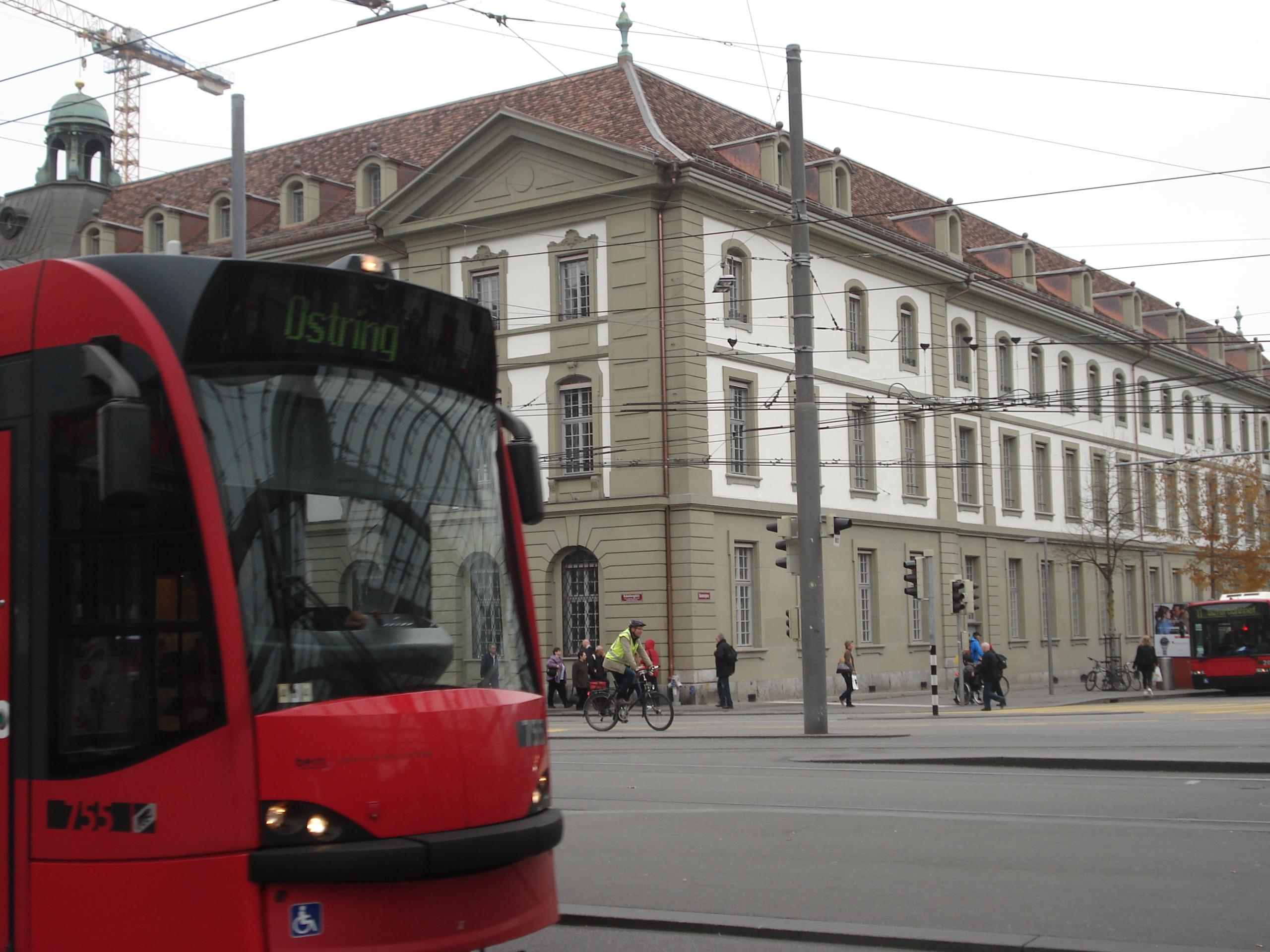The retirees opting for communal living

On the shores of Lake Constance, an interesting concept is being practised by a group of senior citizens. It involves communal living, while having a comfortable home of one’s own. swissinfo.ch visits the peaceful oasis where everyone respects a common set of rules.
Under the crisp autumn sunshine in the town of Kreuzlingen, today, like every other week, is gardening day at Bodan 44+. Ursi Homberger, 62, proudly displays the potatoes she harvested, while three other people work in the garden. Ursi’s husband, Peter, 71, looks on and explains that he would normally be responsible for trimming shrubs, but not today. On a balcony, a neighbour calmly smokes a cigarette. Her duty is to organise events and parties.
All the tasks, such as gardening, entertainment, administration, accounting, maintenance and repairs, are listed, but never imposed. “We do what we enjoy. That’s the main rule,” explains Ursi. “The only thing that we always do – it’s almost obligatory – is to drink coffee together, after work and meetings.”
The idea of this communal living space for elderly residents began ten years ago. Jürg Brühlmann, 60, and his wife, Anna, 65, who formerly lived in a 140-strong cooperative with their children, launched the idea with two other couples.
Today, 16 people, including seven couples and two singles, live in two houses set on 1,800 square metres of land. A renovated historic building, constructed in 1913, has three apartments, each with about 120 square metres of living space. The second house is a modern construction, offering large panoramic windows and six apartments with sizeable interiors. The complex was fitted according to low-energy consumption Minergie standards, uses solar and geothermal energy, and offers underground parking garages and disabled access.
Scrupulous choices
The ideal number of residents was a matter of serious consideration. According to Jürg, “With a group of about 20 people, you have a stable group, while with more than 40, it is less so. On the other hand, a group of seven or eight people is too intimate, like a family, and it becomes difficult.”
The choice of candidates was scrupulous. Peter and Ursi were the only members of the community to belong to the founders’ group of friends. Others were recruited after replying to internet and newspaper adverts. “We met at least 50 people and explained our concept,” Jürg recalls. “A few days later, after consideration, we met those people again to answer questions. Sometimes, a couple would agree, but not their children.”
As the core unit strengthened, preparatory work began. This lasted three years. Each person who joined was involved in the project and wholeheartedly worked on it until its completion, in collaboration with newer partners, allowing the group to fuse.

More
Communal living in Kreuzlingen
Large spaces, a garden and pétanque for all
Peter is an architect, while Ursi is a designer. Their ground-floor apartment, with direct access to the garden, two studies, a large dining room-kitchen area, a living room and a spacious bedroom, is a far cry from what a visitor might expect of a home for the elderly.
In addition to the individual apartments, there are also common areas, such as the garden, and a hall used for parties, literary evenings, concerts, and other activities. On this day, Anna was preparing to welcome 30 former primary school classmates. A guest room can also be rented at the home.
“Ever since we began living here, it has been occupied three-quarters of the time, which shows that our concept works,” Jürg says happily.
The garden, however, embodies the centre of the group’s communal life. It was specifically designed with elderly people in mind. Flower beds and the vegetable garden are 50 centimetres and one metre above ground, respectively. “That way, when I’m 85 years old, I’ll be able to get herbs for Ursi,” Peter says, smiling.
Near the vegetable patch is a large area for playing pétanque, the development of which was the focus of discussions. “We needed a consensus, even to plant two trees in front of the house. We always discuss together whatever may concern our common areas,” adds the architect.
Not within everyone’s reach
Living here can be branded a golden retirement. Given the initial CHF10 million ($10.4 million) investment (of which only CHF100,000 came as support from the Age Stiftung foundation), and with the value of each apartment estimated at CHF1 million, living here is not within everyone’s reach.
In any case, none of the apartments are currently for sale. Even if one were available, rules would apply. Bodan 44+ is not a cooperative, and if an apartment is not bequeathed to heirs, other members of the co-ownership are then given the option to buy. If no one is interested, new owners must be older than 44 years (the idea behind 44+). A requirement of “no further schooling duties” suggests that residents’ children must already be adults.
The spirit of cohabitation is of great importance. “We decided to live together, so everything works well. In reality we are practising a certain form of basic democracy,” Peter explains. “And it mostly works because we had positive experiences in cohabitation during our younger years.”
“It only works for very sociable people, who are sensitive towards others and capable of proposing constructive solutions,” adds Jürg.
“We didn’t know each other before, and it’s better like that, as there is the distance. I feel like here, we are constantly building something together. Whether we are working, walking or watching films together, it all reinforces good neighbourly ties. For me, since I love to talk to other people, it means happiness,” Ursi concludes.
(Translated by Paula Dupraz-Dobias)

In compliance with the JTI standards
More: SWI swissinfo.ch certified by the Journalism Trust Initiative

You can find an overview of ongoing debates with our journalists here. Please join us!
If you want to start a conversation about a topic raised in this article or want to report factual errors, email us at english@swissinfo.ch.